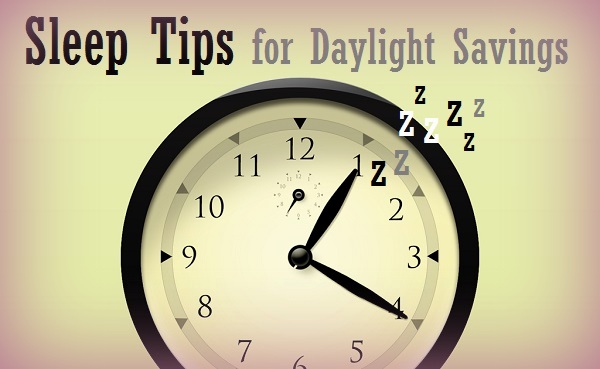Sleep-Well Tips to Prepare for Daylight Savings
Cary, NC — This week, March 2-8, 2015, is National Sleep Awareness Week–which is ironic when you consider the fact that, at 2 am on Sunday, U.S. clocks will spring forward one hour, causing Americans to lose one hour of sleep.
Clocks Jump Forward Sunday
Daylight savings time starts this Sunday, March 8, 2015 at 2 am, when the clocks will spring forward one hour to give us more sunshine and longer days as we head into spring and summer. These days, since many of us depend on automatic clocks (on cellphones, laptops, etc.), there’s little to no worry about setting clocks or getting the time mixed up.
That being said, by Sunday morning, any hand-wound clocks will need to be readjusted to show one hour later than the time they currently register. I suggest double-checking the time shown in your car, since many vehicles don’t automatically adjust for daylight savings time.
Daylight savings time, which will end at 2 am on November 1, 2015, is observed in all U.S. states except Arizona and Hawaii to give us more hours of natural light each day and to conserve energy from artificial lighting. It’s a good thing and, since it’s on a Sunday, a day when many people sleep in, it shouldn’t cause too much sleep interruption.
Sleep Awareness Week
Although, whether brought on by daylight savings time or not, sleeping troubles and disorders like insomnia are a major problem for people of all ages. The National Sleep Foundation (NSF) holds Sleep Awareness Week, an annual public education and awareness campaign, each year to address this growing concern among sleep-deprived individuals.
To promote healthy rest, the foundation conducts yearly experiments and polls to study a variety of variables that affect sleep. In past years, they’ve studied interesting factors like women and sleep, teens and sleep, sleep and ethnicity, and the importance of the bedroom environment.
Sleep-Well During Daylight Savings
The following tips from the NSF can prepare your body for daylight savings time and help you achieve fewer restless nights in general:
- Readjust your clocks for daylight savings early this year–move them forward as early as Friday or Saturday night to allow your body to get used to the change.
- Go to bed a few minutes earlier each night this week.
- Try to stick to a regular sleep schedule as much as possible.
- Exercise daily. Vigorous exercise promotes sleep especially well.
- Avoid caffeine after 3 or 4 pm to ensure that your body can naturally fall asleep.
- Avoid afternoon naps.
- Assess your bedroom environment. A dark room between 60-67 degrees is optimal.
- Assess the comfort of your mattress–memory foam mattresses that reduce motion transfer are the best for interrupted sleep.
- Increase vitamin D levels, which have positive effects on sleep/wake cycles, by spending time in the sun.
Daylight Savings History
Now that you’re prepared for daylight savings time, here’s an interesting fact about the history of the occasion. Although it’s up for debate, the idea for daylight savings time is credited to Benjamin Franklin, who wrote an essay in 1784 that discussed how changing time could save energy. Check out earlier CaryCitizen coverage for more about daylight savings history.
———————————————————————————————————————————-
Photo by kylesteed.



